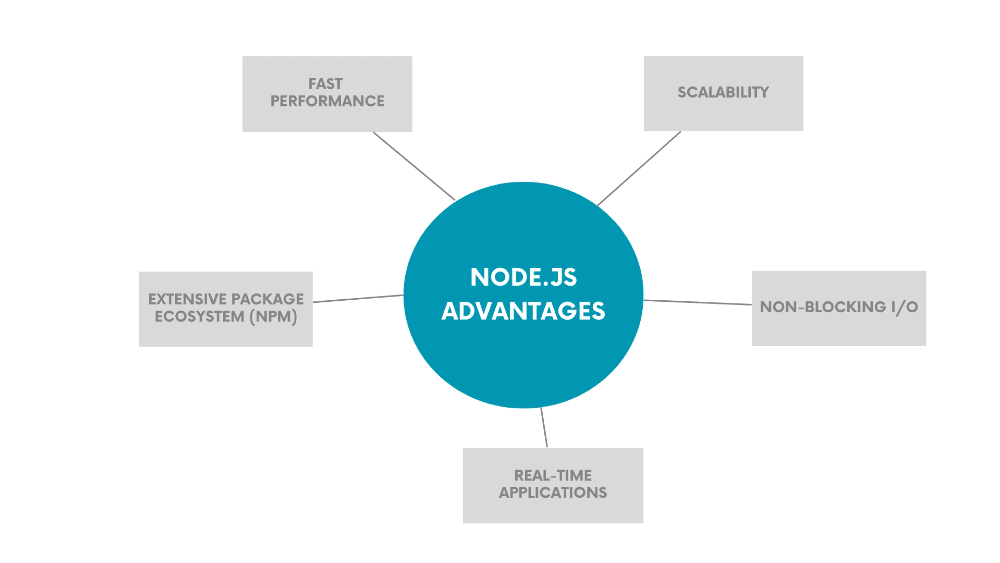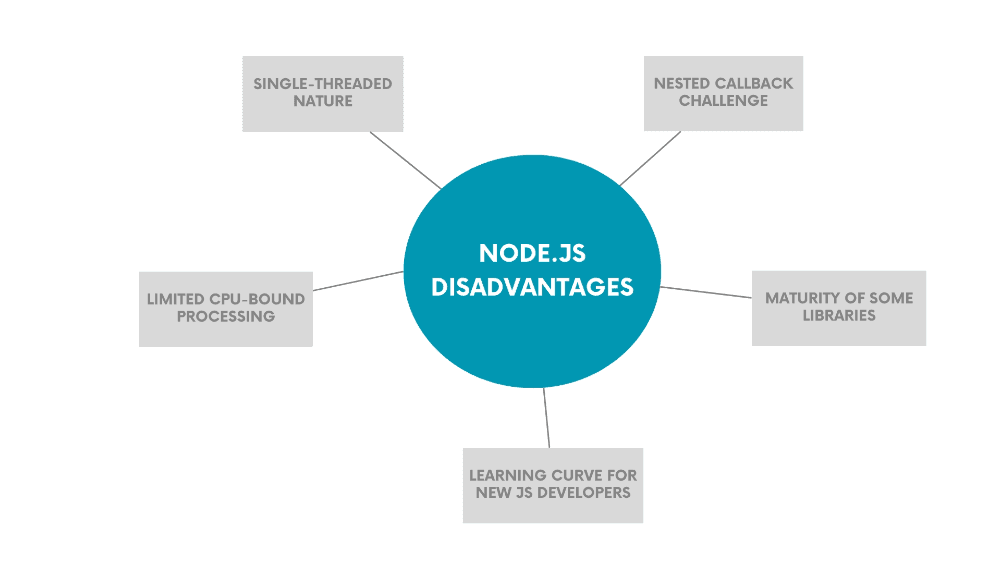The Key Benefits of Using Node.js in Your Projects

About us
MoldoWEB is a software development company, located in Romania, specialized in providing outsourcing and team augmentation services for clients around the world.
Table of contents
- About Node.js
- Node.js Advantages
- Node.js Disadvantages
- How do you choose the right Node.js development company?
- Conclusion
In web development, it’s important to choose the right tools to build your projects with. One popular tool widely used in real-time applications is Node.js. It’s especially renowned for its speed, scalability, and event-driven architecture.
In this article, we’ll talk about Node.js and its advantages, so if you’re considering using it for your upcoming web project, keep reading to learn more.
About Node.js
Node.js is a runtime environment built on the V8 JavaScript engine. With Node.js, developers can execute JavaScript code on the server side, which was originally possible with languages like PHP, Ruby, or Python. With this, JavaScript developers gained many possibilities, being able to use the same language for both client and server-side scripting. Thanks to its unique features and capabilities, Node.js became a top choice for modern web applications.
Node.js Advantages
One of the best things about Node.js is its speed, thanks to its architecture, which allows it to handle multiple tasks at the same time without slowing down. So, for applications that need to respond quickly, Node.js is an ideal choice. This speed is also super important when it comes to creating great user experiences for websites and web apps.
Scalability is an important factor, especially when building applications that might face sudden spikes in activity. Node.js excels in that area, its event-driven, non-blocking architecture handles high-volume concurrent connections, so your application can easily expand without losing performance.
Node.js has a non-blocking Input/Output system, which means that it doesn’t just wait for tasks to complete, instead, while waiting, it keeps processing other requests. This non-blocking nature makes it productive and responsive, which are major parts of apps that require real-time interactions.
Within Node.js, you can find collections of ready-to-use tools through npm (Node Package Manager). These pre-built tools can be libraries to simplify authentication, database interactions, or third-party integrations, all available via npm.
For applications that need quick information exchange between users, such as online games or chat applications, Node.js can handle the job. It easily manages real-time data exchanges with minimal delays, resulting in a great user experience.

Node.js Disadvantages
Node.js is great for many things, however, it does have some drawbacks that are good to know about. Node.js operates on a single thread, which can be great when it comes to handling non-blocking tasks, but it can also be a problem when dealing with CPU-bound operations. These can be for example complex computations, that can monopolize the single thread which can make other requests wait. To mitigate this, developers can use clustering or offloading techniques for CPU-intensive tasks to separate processes.
Node.js often uses callbacks to handle asynchronous tasks. While callbacks are an important concept in Node.js, they can lead to “callback hell”, as developers refer to it. This happens usually when you have multiple nested callbacks, resulting in a code that’s difficult to read and maintain. Solutions like Promises and async/await do address these issues, but they remain an ongoing challenge for developers, important to know about.
For I/O-bound tasks, Node.js is a great choice, but not so much for CPU-bound operations. It might not be the best choice if your app requires computations that need a lot of CPU-bound processing. In this situation, it’s better to use a technology that can easily handle multiple threads or processes.
While Node.js’s ecosystem is rich, not all of its libraries and modules are equally created, some can lack maturity or robustness, leading to challenges when building secure applications. Make sure to use libraries with strong communities and constant maintenance to avoid such issues.
For developers new to JavaScript, transitioning to Node.js can be challenging, especially the asynchronous nature of JS, and Node.js’s event-driven architecture might need some time to learn and get used to.

How do you choose the right Node.js development company?
A good app idea is just the beginning of the journey. Let’s say you have a project and decided to partner up with a Node.js development team to help you build it. Choosing a good partner to collaborate with can help you in many ways. But what makes a good partner? -you might ask. Well, let’s see what to look out for when hiring an outside team to work on your Node.js project.
The first one, obviously is about their expertise in Node.js. Look for a team that has a proven track record in Node.js. The best way to do this is to check out their case studies and portfolios where they used Node.js. You can also observe their problem-solving skills by looking at case studies.
Another important factor would be their client reviews and references. Most tech companies have profiles on different online platforms, for example, Clutch, where you can get detailed information about them, the technologies they use, and of course, reviews. Reading reviews will help you gain insight into the company’s way of working, communication, professionalism, etc.
Think about what your project requires in detail, and make sure the company you choose has the ability and resources to handle it.
How does the company communicate? Do they respond quickly and clearly? This is another important factor since we all know, good collaboration is based on clear communication. Make sure your chosen IT partner communicates well and keeps you involved at all times.
Post-development support is also a key factor to think about. The Node.js company should share its post-development approach at the beginning of the collaboration so that any bug fixes and issues are handled quickly post-launch.
The next one would be about budget. Both parties should be clear and transparent regarding the costs. Beware of hidden costs, and make sure to choose a pricing plan that suits your needs best.
Lastly, having cultural values similar to your development company increases the chances for a successful collaboration and long-term partnership. Make sure to choose a partner that shares similar cultural values with you and your company.
Conclusion
Choosing Node.js for your next web development project comes with many advantages. You can build responsive, real-time applications using this technology. Node.js’s large community can open doors to many new and exciting projects in the future.
However, it does have some downsides worth considering before choosing it for your next web development project. Its single-threaded nature, nested callbacks challenge, and limited CPU-bound processing can lead to challenges in development.
Remember, choosing the right Node.js team for your project will help you achieve success and hopefully, a long-term partnership as well.


